The Rabbi and the Firefighters
Twice in my life, California wildfires came very close to our homes, ten years ago and just this past month. This story is based on a true event from the 2007 California Wildfires. It demonstrates the heroics of the firefighters who risk their lives to protect the life and property of others. The value of helping others is highlighted when a Rabbi comes to their support and they work together to preserve the beautiful world God has given us. It was published in a collection of short stories ” A World of Blessings” in 2013, but the book in now out of print and I am pleased to share the story with children, parents and teachers. Sylvia

On Sunday morning Rabbi Cohen waited as the last child boarded the bus. When the driver pulled away children opened their windows and shouted, “Shalom Rabbi, todah rabbah.” The Rabbi smiled and waved as he headed back toward the Camp offices. He felt the crisp freshness of the mountain air and marveled at the sea of pine cones littering the ground beneath the tall pine trees. The occasional sound of birds broke the stillness that had settled over the camp. This was a place where one could truly feel Hashem’s presence the Rabbi thought.
As he passed a row of cabins, Rabbi Cohen noticed a wisp of smoke in the distance. He pulled aside one of the camp caretakers. “John, what do you think that is?”He asked with concern.
John shrugged, “Hopefully it’s smoke coming from someone’s chimney. If not, I’m sure we’ll hear something soon enough.”
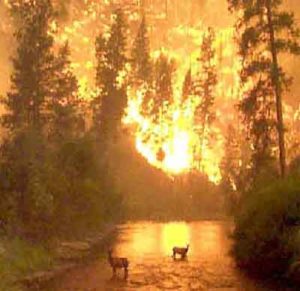 The Rabbi nodded. Whatever happened, it would be in God’s hands. Right now he had to focus on preparations for the next group of campers that would arrive in a few days. An order of food had already been delivered and now only the cabins remained to be cleaned. The phone was ringing when he got to his office. It was from the local fire department. “There’s a fire on the mountain that we hope to get under control,” the caller advised him. “We’ll call you if it becomes necessary to evacuate the camp employees.”
The Rabbi nodded. Whatever happened, it would be in God’s hands. Right now he had to focus on preparations for the next group of campers that would arrive in a few days. An order of food had already been delivered and now only the cabins remained to be cleaned. The phone was ringing when he got to his office. It was from the local fire department. “There’s a fire on the mountain that we hope to get under control,” the caller advised him. “We’ll call you if it becomes necessary to evacuate the camp employees.”
The Rabbi alerted his staff. “I suggest you call your families so they don’t worry. The fire department told me that we are safe for now but if anyone prefers to leave, you certainly may.”
“We’re staying, Rabbi,” they replied.
During the night the winds became gusty and by the next day the sky was filled with smoke and ashes. The firefighters had so far prevented the fire from spreading to an area of homes but they weren’t sure how long they could contain it. Over the next few hours the fire spread across the mountainside burning the forest in its path. The tired firefighters saw the fire grow with each passing hour.
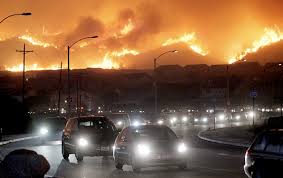
In the days that followed, the fire continued its destruction. Although the firefighters fought bravely, the fire proved too strong. Flames leapt across roadways and into neighborhoods. After several homes were burnt, the Rabbi received another call from the fire department. “It’s time to evacuate the camp,” the caller told him.
Rabbi Cohen gathered the camp employees, “I am asking you to make preparations to go down the mountain. The fire is still out of control and it appears to be heading our way. I’ll stay until all of you have safely left. Remember to drive carefully.”
While everyone packed, Rabbi Cohen returned to his office to call his wife. “Sarah, I’m in the process of helping everyone evacuate the camp.”
 “I’m glad of that, Jacob,” she replied. “I’ve heard that the fire is moving in every direction depending on the wind. And those poor exhausted firefighters are sleeping on the roadways near their trucks. Many haven’t had a hot meal in days but they still battle the fire which gets bigger by the hour.”
“I’m glad of that, Jacob,” she replied. “I’ve heard that the fire is moving in every direction depending on the wind. And those poor exhausted firefighters are sleeping on the roadways near their trucks. Many haven’t had a hot meal in days but they still battle the fire which gets bigger by the hour.”
Rabbi Cohen listened to his wife’s words and made a decision. “Sarah, I think I can be of some help to those men who are working so hard to save the forests and the homes on this mountain. I believe it is important for me stay here to do what I can with the help of Hashem.”
With his wife’s blessings, Rabbi Cohen remained. He drove his jeep to the fire department’s command center which was located in a parking lot not far from the camp. He saw weary firefighters with soot covered faces catching a few minutes rest before returning to fight the fire. Some were napping in makeshift tents while others were sleeping on the ground.
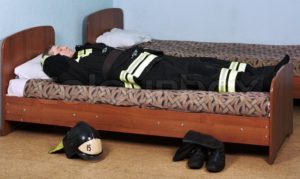 He approached the captain and, after introducing himself, said “I’d like to offer the camp grounds to your men. There they can shower and sleep in proper beds. I also have plenty of food although my cooking skills may not be the best.”
He approached the captain and, after introducing himself, said “I’d like to offer the camp grounds to your men. There they can shower and sleep in proper beds. I also have plenty of food although my cooking skills may not be the best.”
The captain grinned, “Rabbi, that is the best offer anyone has given us and I know my men will appreciate it! Are you sure you don’t mind having a bunch of sweaty, dirty guys stomping around your camp?”
Rabbi Cohen laughed, “As long as I don’t hear any complaints about my cooking.”
It didn’t take long for a group of firefighters to arrive at the camp. They introduced themselves. “Rabbi, we’re so grateful to you,” a tall man named Joe, said.
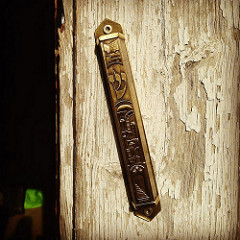 Rabbi Cohen showed them the lodgings. He explained what the mezuzah on each cabin door meant. “They contain a prayer scroll to keep their occupants safe,” he told the firefighters.
Rabbi Cohen showed them the lodgings. He explained what the mezuzah on each cabin door meant. “They contain a prayer scroll to keep their occupants safe,” he told the firefighters.
“That’s reassuring,” Dave, who looked exhausted, softly replied.
Some of the men hadn’t bathed in days and were eager to wash the grime away with the soap and towels provided by the Rabbi. “It’s so good to feel clean again,” Joe remarked. After showering, the men fell into a deep slumber on comfortable beds in the camp’s cabins.
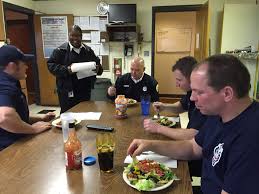 In the days that followed more and more firefighters came into the camp. Rabbi Cohen provided them with fresh fruit, bread for sandwiches, and plenty of coffee and water to drink. Each evening he prepared a hot meal and no one complained about his cooking. One night Joe, told Rabbi Cohen about him about the difficulty of fighting the fire which continued to spread. “We’re pretty sure that the fire was deliberately set.”
In the days that followed more and more firefighters came into the camp. Rabbi Cohen provided them with fresh fruit, bread for sandwiches, and plenty of coffee and water to drink. Each evening he prepared a hot meal and no one complained about his cooking. One night Joe, told Rabbi Cohen about him about the difficulty of fighting the fire which continued to spread. “We’re pretty sure that the fire was deliberately set.”
Rabbi Cohen replied, “One match destroys a thousand homes just like that. If we have the power to destroy the world, we have the power to make it better. All of you are putting yourselves in danger by fighting to make the world better. There is no greater sacrifice.”
Before going to bed each night, Rabbi Cohen would visit the cabins to make certain everyone was comfortable. While visiting Dave’s cabin, the firefighter confided, “Our helicopter support would be better if we didn’t constantly need to refill their water supply at the base of the mountain.”
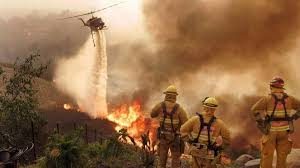 Rabbi Cohen stroked his beard thoughtfully, “Could they use the water from the camp’s pool?” he inquired. Dave called to inform his captain of the Rabbi’s suggestion. The next day a helicopter came to draw water from the pool while Rabbi Cohen refilled the pool using a fire hydrant on the campgrounds.
Rabbi Cohen stroked his beard thoughtfully, “Could they use the water from the camp’s pool?” he inquired. Dave called to inform his captain of the Rabbi’s suggestion. The next day a helicopter came to draw water from the pool while Rabbi Cohen refilled the pool using a fire hydrant on the campgrounds.
 Early Friday morning, Rabbi Cohen began preparing cholent for the Shabbat meals. He called his wife to make sure he had all the necessary ingredients. “Don’t over salt it, Yaacov!” She reminded him. The stew would cook on a low flame so that it would remain warm during the Shabbat observance beginning Friday evening and ending Saturday night.
Early Friday morning, Rabbi Cohen began preparing cholent for the Shabbat meals. He called his wife to make sure he had all the necessary ingredients. “Don’t over salt it, Yaacov!” She reminded him. The stew would cook on a low flame so that it would remain warm during the Shabbat observance beginning Friday evening and ending Saturday night.
Friday night, the firefighters enjoyed the cholent and everyone agreed that it was perfectly seasoned. “May I have the recipe?” Steven, a stout man with a constant grin, asked.
Rabbi Cohen laughed, “I can give you the ingredients but I never measure anything. You just throw in some of this and a little of that and then you let it simmer on a low flame right through Shabbat. The longer it cooks the better it tastes. You’ll see what I mean tomorrow when you eat it again.”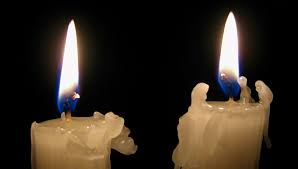
Joe approached the Rabbi and said, “I know that you told us that you aren’t allowed to work on the Sabbath. How do you feel about us fighting the fire during this time?”
“I’m glad you asked me that, Joe. In the Jewish religion saving a life is the most important act we can perform and it is the only time that the Shabbat can be violated. We both know that there are people who decided to stay on the mountain in spite of the evacuation order. I believe that you and the other men are risking your lives to save the lives of others,” the Rabbi solemnly replied.
 The next afternoon Dave returned to the camp with a smile on his face, “Rabbi, “It looks as though we finally have the fire under control and it should be out before too long. You have given us so much valuable support. I don’t know how we can thank you.”
The next afternoon Dave returned to the camp with a smile on his face, “Rabbi, “It looks as though we finally have the fire under control and it should be out before too long. You have given us so much valuable support. I don’t know how we can thank you.”
Rabbi Cohen gave the firefighter a startled look, “It’s not how you can thank me but how I can thank you. With God’s help, you have saved this campground and made it possible for children to enjoy the beauty God has created. It is ‘beshert’, which means ‘that’s the way it is meant to be’, that you have managed to contain the fire on Shabbat. Now you shall all have a well deserved rest. By the way, if you are hungry there is still plenty of cholent.”
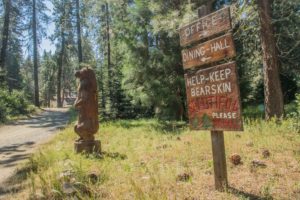 By Sunday morning, the firefighters had beaten the fire. Many were eager to return to their families. Rabbi Cohen personally went to say goodbye to each of them. Joe shook his hand and said “Thanks for everything. It was great staying here.” Then as he took one last look at the campgrounds, he asked, “So you own this whole place, Rabbi?”
By Sunday morning, the firefighters had beaten the fire. Many were eager to return to their families. Rabbi Cohen personally went to say goodbye to each of them. Joe shook his hand and said “Thanks for everything. It was great staying here.” Then as he took one last look at the campgrounds, he asked, “So you own this whole place, Rabbi?”
Rabbi Cohen shook his head, “God owns the world. Like you, I’m just here to help take care of it.”
